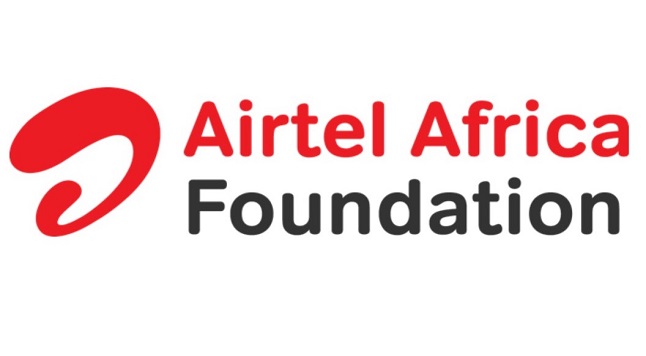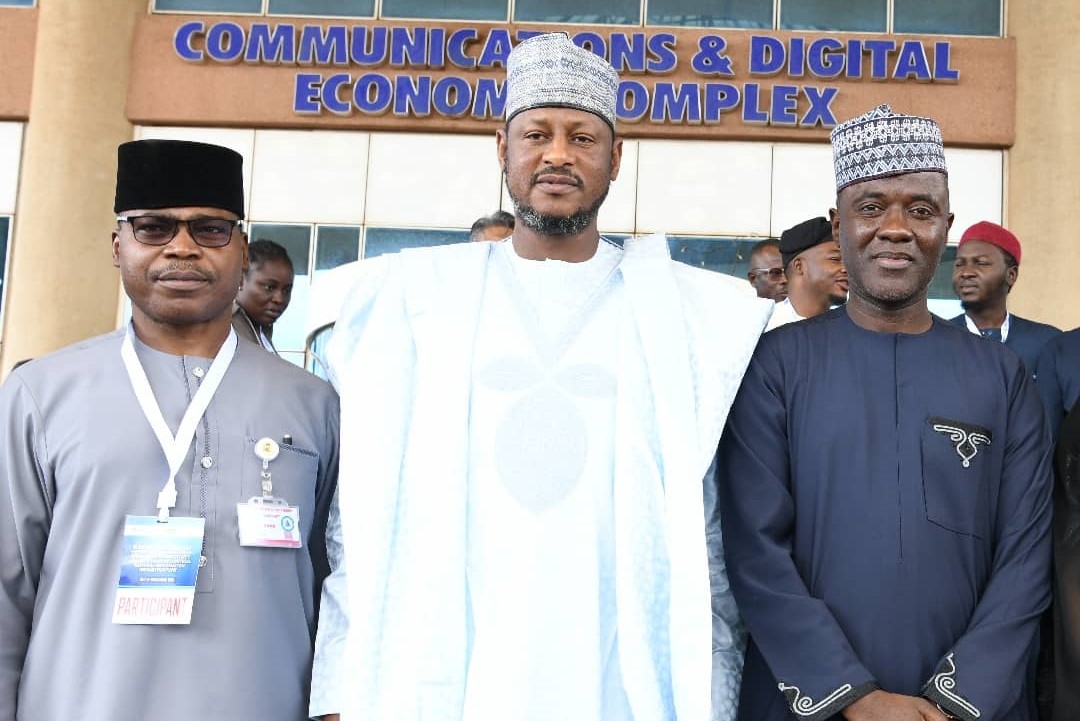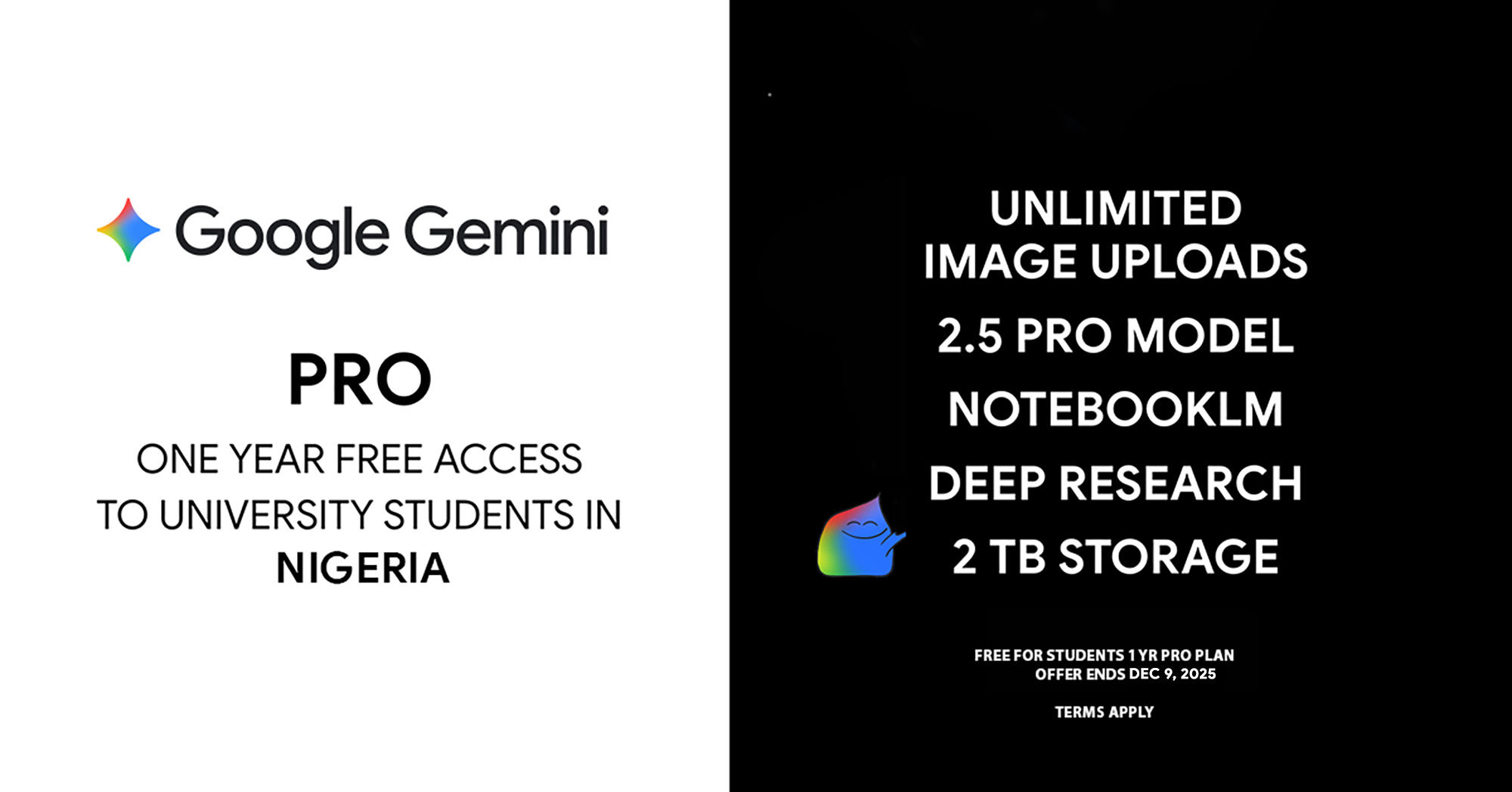Telecom
Telecoms@20: NCC Lists Next Frontiers for Industry Growth

As stakeholders in Nigeria commemorate 20 years of telecoms revolution in Nigeria, the Nigerian Communications Commission (NCC) has clearly identified key initiatives being implemented to consolidate the growth and gains of the telecom sector.

Prof. Umar Garba Danbatta, executive vice chairman of the Commission, listed the digital frontiers while delivering a paper titled: ‘Telecommunications in Nigeria: The Next Frontier’ at the 20th anniversary of the telecommunications revolution in Nigeria organised recently by Compact Communications Limited, at the Muson Centre, Lagos.
At the event, the Commission received a recognition award “in appreciation of its institutional support to the growth and development of telecoms in Nigeria”.
The EVC of NCC also received a separate award “in appreciation of his immense contribution to the growth and sustenance of telecoms development in Nigeria.”
Represented at the forum by NCC’s Director, Public Affairs, Dr. Ikechukwu Adinde, Danbatta said in the last 20 years, the sector has witnessed significant growth in subscribers, internet usage, investment, innovation, contribution to Gross Domestic Product (GDP) and multiplier effects of the growth in other sectors of the economy.
Danbatta stated that in collaboration with relevant stakeholders, NCC is driving new frontiers aimed at ensuring consistent growth of the nation’s digital economy sphere.
According to him, as a foremost telecommunications regulatory agency and consistent with NCC mandate as stipulated in the Nigerian Communications Act (NCA) 2003, and other guiding legislations, the NCC has been at the forefront of leveraging latest technologies and accelerating broadband infrastructure deployment to put Nigeria on the global map of the digital economy experience.
In this regard, he said NCC was working to ensure increased broadband penetration in line with Federal Government’s targets as contained in the Nigerian National Broadband Pan (NNBP), 2020-2025. The NNBP was launched by President Muhammadu Buhari in March 2020.
Danbatta explained that the NNBP has a target to achieve 70 per cent broadband penetration among 90 per cent of the country’s population. The Plan also seeks to achieve broadband speeds of 15Mbp and 25Mbps in rural and urban areas respectively over the next five years.
“The Commission is also driving various initiatives aimed at facilitating the deployment of Fifth Generation (5G) Mobile Technology in Nigeria.
Prof. Danbatta emphasized that a robust broadband infrastructure will play a key role in fast-tracking the effective deployment of 5G technology and facilitate availability of services associated with 5G technology.
“Already, the Commission is set to auction some spectrum slots in 3.5GHz band and we have confirmed 97 per cent readiness for 5G deployment in this regard.
“This is in line with the marching order given to us by Prof. Isa Ali Ibrahim (Pantami), Minister of Communications and Digital Economy, following approval by the Federal Executive Council to proceed on our 5G Deployment Plan.
“The Information Memorandum (IM) for the auction had earlier been shared with stakeholders and we are set to auction the 5G spectrum before the end of the year,” he said.
The NCC Chief Executive also said one of the initiatives being emplaced by the Commission to enhance the attainment of the next frontier for telecom development in Nigeria and the nation’s economic growth, is the ongoing review of licensing structure in the sector.
This is to align telecoms licensing process with the wide range of technological advances, convergence of technologies and services shaping global telecoms space.
Danbatta said the Commission has also finalized review of its Spectrum Trading Guidelines (STG). The STG, according to the EVC, allows spectrum resource in-country to be traded on the Secondary Market through Transfer, Sharing or Leasing (TSL) once the stipulated regulatory conditions have been complied with.
Danbatta declared that NNBP 2020-2025 requires that these Guidelines be reviewed to ensure that un-utilised spectrum is fairly traded to facilitate rollout by other operators among others. The Guidelines will, therefore, facilitate the country’s yearning for ubiquitous broadband access in line with the economic agenda of the Federal Government.
As vehicles for implementation of the NNBP, the National Digital Economy Policy and Strategy (2020-2030) and other similar digital economy policies, Danbatta said the NCC has unveiled its Strategic Management Plan (SMP) 2020-2024 and the Strategic Vision Plan (SVP), 2021-2025, which will ultimately drive the next frontier of growth in the telecoms sector.
He said the two strategic plans embody critical areas on which the Commission intend to focus toward driving the implementation of the digital economy agenda of the government.
He stated that the two regulatory documents (the SMP and SVP) encapsulate the totality of regulatory and policy initiatives, designed to re-invent and transform the telecom ecosystem, within the context of regulation, to a greater height.
He added that this, to the Commission, is the next frontier for the sector. “While emerging technologies are disruptive by nature, Nigeria cannot afford to lag behind digitally and this explains Commission’s engagement with developmental regulations for the industry and we are irrevocably committed to this,” he said.
Other individuals bestowed with recognition awards at the event include Former President Olusegun Obasanjo; and the former EVC/CEO of NCC, Dr. Ernest Ndukwe, both for pioneering the Global System for Mobile Communications (GSM) revolution of 2001.
The Zenith Bank also received an award for being at the forefront of leveraging technology for powering financial services delivery.
Among the journalists who received awards is a veteran ICT journalist/Publisher, E-World News, Aaron Ukodie.
Telecom
Airtel Africa Foundation Launches 100 Tech Scholarships for Nigerian Undergraduates

Following the recent announcement by its Chairman, Dr. Segun Ogunsanya, at a World Press Conference held in Lagos recently, the Airtel Africa Foundation, through Airtel Nigeria, has kicked off its Undergraduate Tech Scholarship Programme to benefit 100 Nigerian undergraduates.

This initiative will provide each recipient with a grant covering tuition, accommodation, study materials, and a stipend from the first year of study through the final year. This financial aid removes economic barriers, empowering students to dedicate their focus to academic and technical achievement in technology.
Eligible courses of study include Computer Science, Information Technology, Data Science, Software Engineering, Cybersecurity, Artificial Intelligence, and other ICT-related disciplines.
Commenting on the initiative, Dr. Ogunsanya affirmed that the scholarships represent the Foundation’s continued commitment to breaking down barriers for young Africans.
“At Airtel Africa Foundation, our vision has always been to create opportunities where talent meets ambition. With this scholarship, we are investing in Nigeria’s future tech leaders, giving them the resources and confidence to thrive in an increasingly digital world,” he stated.
Beneficiaries are selected from 100-level students enrolled in approved programmes in participating public universities across the country. These institutions include the University of Lagos (UNILAG), the University of Nigeria, Nsukka (UNN), Ahmadu Bello University (ABU), the University of Benin (UNIBEN), Obafemi Awolowo University (OAU), the University of Ilorin (UNILORIN), and Tai Solarin University of Education (TASUED).
Airtel Nigeria CEO, Dinesh Balsingh, noted: “The prioritization of education as a pillar of our social investments becomes much stronger with these 100 new scholarships. They build on such other initiatives as our partnership with UNICEF on the Reimagine Education Programme, our Adopt-A-School project, and our 1 billion naira investment in the Three Million Technical Talent (3MTT) effort of the Federal Government. Ultimately, for us as an organisation, the best way to equip the future is to arm it with cutting-edge education.”
The undergraduate scholarship is a direct component of the Foundation’s four strategic pillars of Financial Inclusion, Education, Environmental Protection, and Digital Inclusion (FEED).
Telecom
NCC’s Maida Calls for Unified Action to Accelerate Broadband and Safeguard Telecom Infrastructure

Dr. Aminu Maida, Executive Vice Chairman of the Nigerian Communications Commission (NCC), has called for urgent collaboration among Nigeria’s states and stakeholders to accelerate broadband connectivity and safeguard critical national infrastructure.

L-R: Director, Critical National Assets and Infrastructure Protection, Office of the National Security Advisers (ONSA), Enebong Effiom; Executive Governor, Katsina State, Dikko Radda and Executive Vice Chairman/Chief Executive Officer, Nigerian Communications Commission (NCC), Dr. Aminu Maida, during a business roundtable on broadband investment and critical national infrastructure protection hosted by the Commission in Abuja on Wednesday (October 8, 2025).
Speaking at a business roundtable held at the NCC Digital Economy Complex on Wednesday, October 8, 2025, the EVC emphasized broadband as a national imperative for economic growth, security, and digital inclusion under the theme, “Right of Way and Protection of Broadband Infrastructure – The Road to Success in Broadband Investment and Connectivity.”
Dr. Maida began his remarks by underscoring the invaluable role of connectivity across industries, citing examples from Enugu’s industrial sector to security services relying on real-time data. “When connectivity fails, opportunities evaporate, productivity stalls—and in critical situations, lives can be put at risk,” he said.
He stressed that broadband today transcends faster downloads or video calls; it is the bedrock of economic inclusion and national resilience.
According to the EVC, Nigeria’s broadband penetration stood at approximately 48.81 percent as of August 2025, with over 140 million Nigerians online. Highlighting the sector’s contribution to GDP, he cited research indicating a 10 percent broadband increase could boost GDP by 1.38 percent in developing countries.
Expanding broadband access, Dr. Maida said, would multiply economic opportunities, enabling new jobs, services, and innovation hubs across Nigeria’s states.
He referenced Rwanda and India’s success stories, where coordinated investments in fiber infrastructure and digital governance transformed their economies into emerging digital powerhouses.
The EVC lauded the leadership of President Bola Ahmed Tinubu and Communications Minister Dr. Bosun Tijani for pursuing the National Broadband Plan (2020–2025) with ambitious targets of 70 percent broadband penetration and deployment of 90,000 kilometres of fiber backbone by year-end.
To this end, the NCC has translated these goals into strategic actions despite operational challenges.
Among the NCC’s key initiatives, Dr. Maida highlighted the Critical National Information Infrastructure (CNII) Presidential Order signed in June 2024, which empowers law enforcement agencies to combat vandalism, theft, and denial of service attacks on telecom infrastructure.
The Commission, working closely with the Office of the National Security Adviser (ONSA), has operationalized this order through a Telecommunications Industry Working Group focused on site security, maintenance, and access control.
Complemented by public awareness campaigns and collaboration with judicial and security institutions, this effort has led to the dismantling of major vandalism cartels over the past two years.
Addressing the historic challenge of high Right of Way (RoW) fees—levied variably by states and often hindering fiber rollout—the EVC disclosed successes in advocacy resulting in five additional states (Adamawa, Bauchi, Enugu, Benue, and Zamfara) waiving these fees, bringing the total to eleven states without RoW charges.
Seventeen other states have capped fees at the Nigerian Governors Forum benchmark of N145 per linear meter. Dr. Maida underscored ongoing efforts to achieve uniform, predictable RoW regimes nationwide, coupled with “dig-once” coordination with public works to share ducts and plans, cutting fiber damage and civil works costs.
The NCC further strengthened investor confidence by approving cost-reflective and competitive tariff rates earlier this year, prompting operators’ collective commitment of over $1 billion in broadband rollout investments across Nigeria.
To enhance market openness, the Commission has commissioned a wholesale fiber study to facilitate backbone sharing between owners and Internet Service Providers, unlocking last-mile expansion and faster backhaul.
On transparency, the Commission expanded performance disclosures, including outage reporting, quality of service dashboards, and compliance metrics to drive accountability.
Despite these achievements, the EVC highlighted continuing challenges: from January to August 2025, Nigeria recorded 19,384 fiber cut incidents, 3,241 equipment thefts, and over 19,000 cases of denied access to telecom sites, causing prolonged outages and increased security costs.
Further obstacles include fragmented and unpredictable RoW regimes, weak coordination with road authorities, energy supply volatility, multiple taxation, and bureaucratic permitting processes.
Dr. Maida warned of the urgency, citing the accelerating global digital race driven by artificial intelligence and outsourcing movements favoring low-cost, high-connectivity environments. “If our broadband backbone is weak, our youth will be marginalized, and our economy will likely not achieve its full potential,” he said, underscoring that communities without digital connectivity today are essentially invisible.
The EVC urged governors and state authorities to partner in enforcing telecom infrastructure as critical assets; adopt 100 percent RoW waivers or at minimum NGF benchmarks with clear timelines; institutionalize coordination between public works and operators; embrace transparency in fees and processes; establish state digital infrastructure funds to attract private fiber investment; and support energy resilience through hybrid and solar power at telecom sites.
Looking ahead, Dr. Maida announced two major NCC initiatives to be launched the next day: an Ease of Doing Business Portal offering a one-stop-shop for all 36 states and the Federal Capital Territory, and the Nigeria Digital Connectivity Index (NDCI), a framework to annually measure and publish states’ digital readiness and competitiveness to enhance accountability and drive improvements.
He concluded with a powerful call to action: “The digital revolution does not wait. Let us align, invest, and protect, for the prosperity of our people and the future of our nation.” He left the audience with one final question, “Will we align—or be left behind?”
This roundtable marks a pivotal moment in Nigeria’s journey toward a digitally inclusive and economically robust future, positioning broadband connectivity and its protection as strategic national imperatives.
Telecom
Google Empowers African Students with Free AI Tools for a Year

Google today announced a major initiative to support higher education across Africa by offering its premium AI subscription, Google AI Pro for free to university students for 12 months.

The offer is available to eligible students aged 18+ in Nigeria, Kenya, Ghana, Rwanda, South Africa, and Zimbabwe, providing them with access to Google’s most advanced AI tools to enhance their learning, research, and creative work.
Through Google’s most capable model, Gemini 2.5 Pro, this initiative will equip the next generation of African leaders, innovators, and creators with fundamental AI literacy. By placing powerful generative AI tools directly in the hands of students, Google is helping to prepare them for a workforce where AI proficiency is increasingly essential.
“We are seeing a new wave of innovation in Africa, driven by the energy and ingenuity of our young people,” said Alex Okosi, Managing Director for Google in Sub-Saharan Africa. “By providing students with access to our most advanced AI tools, we want to empower them to not only excel in their studies but also to become critical builders and shapers of the future. This offer is about democratizing access to technology and giving African students the skills to compete and lead on a global stage.”
The Google AI Pro plan provides a comprehensive suite of tools designed for the demands of academic and creative life:
Supercharged Learning and Research: With new features like Guided Learning to help students with in-depth research, summarizing academic papers, debugging code, and step-by-step guidance on complex problems.
Time-Saving Efficiency: Use Deep Research to generate comprehensive, cited reports from hundreds of web sources in minutes, transforming how students approach long-form assignments and dissertations.
Enhanced Organization and Creativity: Leverage NotebookLM to organize notes and connect ideas and use Veo 3 to instantly transform text prompts or images into short, high-quality videos for presentations and projects.
Massive Storage: Receive 2 TB of cloud storage across Google Drive, Gmail, and Photos, ensuring ample space for coursework, research data, and creative portfolios.
How to Sign Up
University students in eligible higher education institutions and countries can verify their status and activate the 12-month free plan by visiting gemini.google/students. The process is designed to be simple, requiring students to verify their status through various methods and to add or confirm a form of payment (without incurring any charges). The offer will be available for redemption for 60 days, from October 7, 2025, to December 9, 2025.
This student offer builds on Google’s long-standing commitment to Africa’s digital transformation through programs like the Google for Startups Accelerator Africa and the Digital Skills for Africa initiative, which have helped millions of people and businesses grow.

 Telecom2 days ago
Telecom2 days agoAkwa Ibom, T2 Set to Drive Digital Transformation

 E-Business2 days ago
E-Business2 days agoKaspersky, Partners Launch a Career Orientation Test to Inspire more Girls into Cybersecurity

 E-Financial2 days ago
E-Financial2 days agoAfDB to Lend Nigeria $500m in Fresh Budget Support

 Telecom1 day ago
Telecom1 day agoChronicles Software unveils free SuccessBOX.ng platform for SS3 students, announces ₦10m reward scheme

 E-Financial2 days ago
E-Financial2 days agoCBN Releases New Guidelines, Caps POS Agent Daily Transactions at N1.2m

 Telecom2 days ago
Telecom2 days agontel Gets Fresh Capital Injection for 2026 Relaunch

 E-Financial2 days ago
E-Financial2 days agoFidelity Bank Hosts Black-Tie Gala Honouring Afreximbank President Prof. Benedict Oramah

 E-Financial2 days ago
E-Financial2 days agoReps Plan to Regulate Cryptocurrency, PoS Operations

























